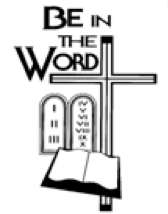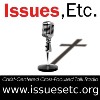
Being “in the Word” was a point of emphasis of the now-sainted Rev. Dr. Alvin Barry, a previous president of the Lutheran Church—Missouri Synod, and it is an exhortation we always do well to heed. Rev. Dr. Barry’s immediate successor, Rev. Dr. Robert Kuhn, also once suggested that renewing our commitment to the Word of God would be helpful.
If you are even reading this page, you are to be commended for your interest in daily Bible reading! Daily Bible reading is a great way for you to “Be in the Word!” and for God thereby to be in you! While there are any number of ways to approach daily Bible reading, we suggest using a particular plan that gets you through the whole Bible in one year. This page discusses daily Bible reading according to that particular plan and links you to resources to follow it.
Overall, Holy Scripture is priceless to us because in it we find Jesus, Who lived, died, and rose again that we might have the forgiveness of sins, life, and salvation. Jesus is in at least some way the center of all the Bible records. Jesus says the holy writings “bear witness about Me” (John 5:39 ESV). The things that are written in Holy Scripture are written, as St. John reports, that we “may believe that Jesus is the Christ, the Son of God, and that believing [we] may have life in His Name” (John 20:31 ESV). Such is true not only of St. John’s Gospel account, but St. Paul can write to Timothy that “All Scripture is breathed out by God and profitable for teaching, for reproof, for correction, and for training in righteousness, that the man of God may be complete, equipped for every good work” (2 Timothy 3:16-17 ESV).
So, not only members of Pilgrim Lutheran Church but also any and all individual Christians can benefit from daily Bible reading (even if not done according to the particular list of daily readings we suggest). The particular list we suggest is the “Daily Lectionary” from our Synod’s 1982 hymnal Lutheran Worship (pages 295-299), where the following is given by way of introduction:
This outline is a devotional reading plan that covers the entire Sacred Scriptures each year. The selections are based on ancient models and are generally in harmony with the liturgical church year. The average reading is three chapters daily. A seasonal canticle is assigned for each month and is scheduled to replace the psalm on the first and last days of the month. All of the psalms are read twice a year.
The lectionary is in accordance with Martin Luther’s suggestions: “But let the entire Psalter, divided in parts, remain in use and the entire Scriptures, divided into lections, let this be preserved in the ears of the church.” Also: “After that another book should be selected, and so on, until the entire Bible has been read through, and where one does not understand it, pass that by and glorify God.”
Our Pastor Galler has himself followed the Daily Lectionary a number of times and, in encouraging his previous parishes to also follow it, has developed resources to help others follow it and increase their understanding as they do so. God being willing, we will make improved resources available in the future, but for now we point you to the following:
- Our Pilgrim, Kilgore, newsletters with the lists of daily readings and background information for them, as well as some more-recent Questions and Answers that are not available elsewhere
- The Grace, Elgin, Daily Lectionary pages previously developed by Pastor Galler, particularly the Biblical Index page, where you can easily access all the information on that site relevant to a particular reading by looking up a particular book and chapters (generally your will be best served by clicking on the link for the last “Biblog Post” given, which Post should give you a more-meaningful way to access the given Questions and Answers)
You are always welcome to ask questions about your reading or listening, if you are using audio cassettes, CDs, or MP3 files. Ask your questions in person, over the phone, or via email (do not use the address on the Grace site, however, but use the one on the right side of this page). In our Sunday Adult Bible Class Pastor Galler is setting aside time for Daily Bible Reading questions. Questions asked privately will be treated anonymously if he answers them publicly.
In connection with your reading, you might want to pray the traditional Collect for the Word:
Blessed Lord, Who hast caused all Holy Scriptures to be written for our learning, grant that we may in such wise hear them, read, mark, learn, and inwardly digest them, that by patience and comfort of Thy holy Word we may embrace, and ever hold fast, the blessed hope of everlasting life, which Thou hast given us in our Savior Jesus Christ, Who liveth and reigneth with Thee and the Holy Ghost, ever one God, world without end. Amen. (The Lutheran Hymnal, page 14.)
For additional prayers, see this page of the Grace, Elgin, site. Finally, remember that in all our Bibe reading, daily or not, God’s Word accomplishes that which He pleases (Isaiah 55:10-11)!

